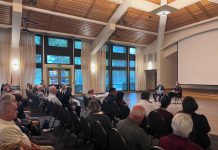There is a fair amount of hand wringing in the newspaper
business these days about the changes happening in the industry.
The Internet has made terrific inroads into print, and podcasts and
broadband content are worries looming on the horizon.
There is a fair amount of hand wringing in the newspaper business these days about the changes happening in the industry. The Internet has made terrific inroads into print, and podcasts and broadband content are worries looming on the horizon.
So, in media circles – whether it’s newspapers like this one, or radio and television, the talk is that they have to become platform agnostic to survive. That is a rather inelegant way of saying you can get stuff on paper, on television or radio, on the Internet, or on your iPod or cell phone. What is not in the talk is exactly what that stuff is and what its quality is. I’m no technology Luddite, but I’m looking for more than newspaper reporters reading their stories into a tape recorder so that I can download them onto my iPod. I think the key to the media’s problem is that as a news consumer, I’m not sure I know what I am looking for, but I do know that I haven’t found it yet.
Perhaps we in journalism have yet to find a visionary in this area. In the past there were a few visionaries in journalism. Some were unintentional visionaries, but their actions have clearly set the path for where the industry has gone.
Ed Murrow knew how to build a team that set a legacy and others have long strived to copy it.
Everyone from Time Magazine to CBS News had at one time given thought to a 24-hour television news channel. But it took a billboard salesman, Ted Turner to make it a reality.
Paddy Chayefsky wrote movie scripts. In 1977 his film Network looked into the crystal ball of television news and discovered the future. Watch the film. See the story evolve and the picture that emerges 30 years later is now what we watch everyday.
A few years after that, Don Henley wrote the song Dirty Laundry. How prescient he was in extrapolating that scandal was more viewable than information and that heat was worth more than light. One of his lines is perfect, “everyone knows that crap is king.”
Ironically, we laughed at Network. Not only did we laugh at Dirty Laundry, it became a video played at the White House Correspondents Association dinner in 1981. A couple of producers gathering material from the networks, CNN and some of the Washington stations produced something called “The Tapes of Wrath” with Henley’s song as the narration. It was exceedingly well done by an ABC News producer named Sharon Young. The problem here is that we laughed. We should have cried.
Look at what makes news, disappearing blondes, ideology-based shout fests, water skiing squirrels and bears sleeping in hammocks. We get reality shows that in reality are scripted as much as a movie. We have journalists taking a hack saw to their credibility in hosting these programs. We don’t get what the news consultants call the boring stuff, the workings of government, the stories behind the story or the explainers that tells us what something means and who the key players are.
We’re willing to watch grown men and women eat bugs. But we won’t watch coverage of a war unless it is bloodless. We can’t wait to see political leaders sneak into Baghdad to proclaim success, but we turn the dial when a report is broadcast on starving children in Africa.
We can’t hang up the phone long enough to read the local newspaper to see what’s happening in the town we all live in and many of us work in. The only time we take the iPod earplugs out is to watch John Stewart give us a fake newscast. Would it be wrong to assume that we would rather be entertained than informed?
So many in Morgan Hill have been critical of the Community Conversations, but their apathy overwhelms them. If the city council members table hopped at every Starbucks in town, would they have learned more? I doubt it. Decisions are made by those who show up. If you don’t want decisions about your town being made by 300 people out of a population of 35,000, then show up and make it 301. Bring your friends and neighbors and make it 400. But don’t just complain, offer solutions. Even if you think the outcome is pre-determined, show up and perhaps you can change it. If enough of your neighbors and friends show up, you will change things. Plato said, “The price of apathy towards public affairs is to be ruled by evil men.”
If you don’t like what is in this newspaper or know something is factually incorrect, email the editor, pick up the telephone and call or even more simply, show up at the newspaper’s front door.
This is not about politics. It is about perspective.
This is not about pundits. It is about people.
While you were speeding through town talking on your cell phone or playing games on your computer, the world around us was evolving.
We are competing against countries with educated and engaged populations, where information is king and crap is what gets swept off the streets.
David Cohen, a member of this newspaper’s editorial board, is a corporate speechwriter who lives and works in Morgan Hill. He is also a graduate of the 2005 class of Leadership Morgan Hill and serves as president of the Community Law Enforcement Foundation of Morgan Hill.







